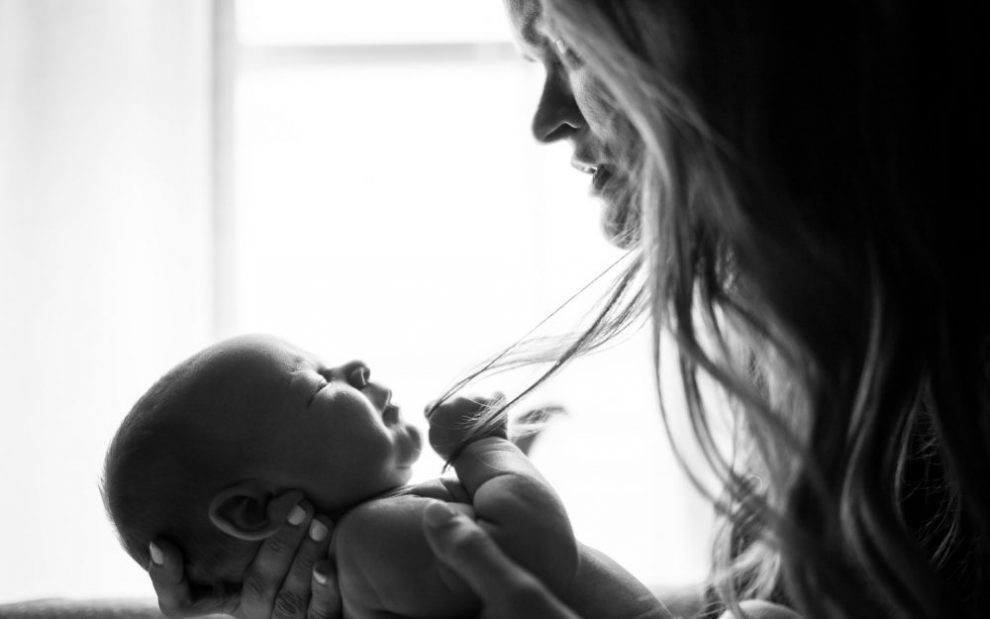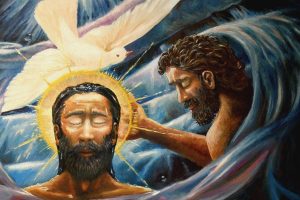Just one month after a rather challenging birth, my husband, a lieutenant commander in the Navy Reserve, deployed to Djibouti, Africa. Four months into single parenthood with a five-month-old, I found myself amid a panic attack in the middle of the night. Struggling to breathe, afraid of my shadow, my mind had convinced me that I would black out and harm my infant daughter.
With no one else in the house but myself, the baby, and an 80-pound dog, I became awash with terror. Fortunately, my husband, though thousands of miles away, answered my frantic phone call and recognized that I was having a breakdown. Through my sobs, I heard his firm guidance, “Breathe with me: in, two, three, out, two, three.” After what felt like the longest minutes I’ve lived through, I began to feel the ground re-form under my feet.
The next day at work after a tearful and shameful confession, my friend insisted that I call the doctor. He refused to let me leave until I had a confirmed appointment. A river of tears later the doctor confirmed it: I had postpartum depression. I think the only person surprised by the diagnosis was me.
Because often mothers don’t share their scary thoughts and baby blues, I felt isolated, like I was the only one hating the hand motherhood had dealt me. I felt like I was failing to measure up to the model of motherhood I had created for myself during the nine months it took to knit her together in the womb. I had pictured joyous stops at coffee shops and mommy-and-me yoga, not sobs in the middle of the night and a prescription for Sertraline.
Despite my own feelings of guilt surrounding the label of PPD, both my coworker and doctor affirmed that I had not failed as a mother. Alone with my thoughts though, the shame returned.
In the days that followed, as I continued to process what the doctor said, I started to wonder whether Mary experienced postpartum depression, too. Isolated, exhausted, accosted by new visitors . . . coupled with the fact that this son was no ordinary son. How could she not feel frozen under the knowledge that the person to whom she’d given birth held so much in his tiny hands?
I had pictured joyous stops at coffee shops and mommy-and-me yoga, not sobs in the middle of the night and a prescription for Sertraline.
Did Jesus come out with impossibly long fingernails, too? Did he cry right away? Was that first day peaceful and that second day a blur of nursing, exhaustion, and tears? Did Mary frantically wake Joseph in the middle of the night, shaking uncontrollably as her postpartum body normalized? Did she freeze in her tracks, feeling the new mantle of anxiety placed on her shoulders?
I think we automatically categorize Mary as perfect mother, but that fails to encompass the intensity of the emotions with which she must have been awash in the days, weeks, and months after giving birth. My constant comfort through the anguish of postpartum depression was the nagging in my mind that maybe Mary was here, too.
It’s easy to think that Mary couldn’t possibly have been anxious because she experienced the first fruits of her son’s own labor. Yet, scripture says that she felt “great anxiety” when she realized Jesus was missing after the Festival of Passover (Luke 2:48). That moment exposes it: Mary worried like every other mother. There is inherent anxiety wrapped up in this gift of motherhood. I was not alone.
In Mary, I found a mom who knew what I was going through. She understood the anguish and the constant stress. She understood the feelings of failure to measure up. She understood the dreamlike—or perhaps, nightmarish—state of those first weeks and months of motherhood.
Rather than offer me platitudes like, “the dishes can wait,” Mary offered me the grit and determination of a mom who traveled while extremely pregnant and gave birth in a cave. She wiped my tears without telling me to stop crying, reminding me that she knew personally the depths of maternal sorrow. She held my trembling hands without telling me to just calm down. She looked deep into my soul and saw my good intentions intertwined with my fear of not measuring up, offering her encouragement to me like she had to Jesus at the Wedding at Cana.
Without my husband next to me during those deployment months, I felt alone and unheard. Mary kept appearing, reminding me that I was actually far from isolated. She showed herself in my coworker, my doctor, my own mom, and countless others who reached out to me on the road to healing.
Mary offered me the grit and determination of a mom who traveled while extremely pregnant and gave birth in a cave.
The aftereffects of postpartum depression remain, occasionally rippling through my body like aftershocks from an earthquake. Creation is no easy event. When I feel weak, I call on Mary to hold me. She’s never failed me, always showing herself to me through family and friends.
Through them, she’s taught me to let go of my own expectations of motherhood. There will be scary emotions and thoughts. Those things should be shared with trusted people, but there is no inherent shame in them. Motherhood is messy; we must stop putting so much pressure on ourselves to live uncomplicated lives.
I’ve found what works for me in navigating PPD—a prescription that helped lift the fog, getting more quality sleep, and setting a goal to run a half and then a full marathon with my family in tow. Through confidence in Mary, I’ve reached out to those around me and found a way forward.
Many of us likely know of a new mom who won’t admit she needs help until she’s brought to her knees in the dark of night. Let us be brave enough to reach out to her, offering to be her companion as Mary was mine.
Image: Unsplash/Zach Lucero













Add comment